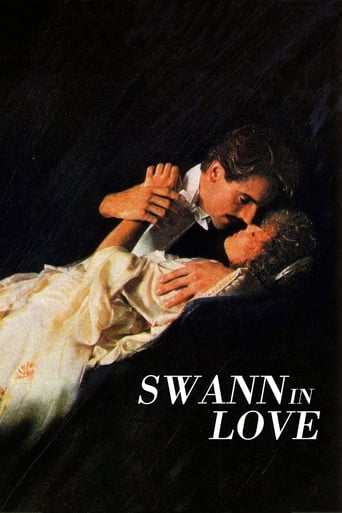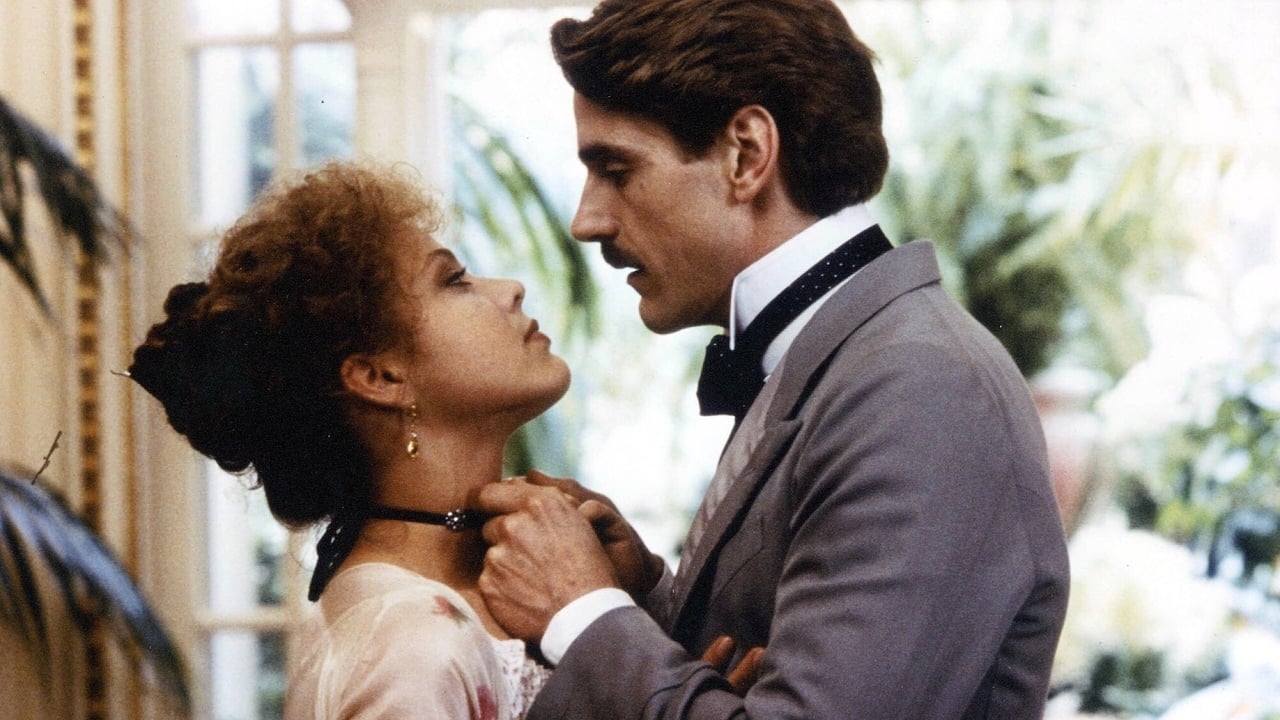jandesimpson
Let's face it, Proust's monumental "A la Recherche du Temps Perdu" is probably unfilmable. The Chilean director Raoul Ruiz had a commendable shot at adapting the final volume "Time Regained" in 1999 that achieved a certain measure of critical acclaim in spite of being rather diffuse with not all the characters clearly presented. ( I think you have to know the novel well to fully appreciate it). A rather more satisfying attempt appeared fifteen years before with Volker Schlondorff's "Swann in Love". By concentrating more modestly on what is really a vignette, a novella tucked within the vast structure, Schlondorf achieved a work with a real sense of cinematic concentration. There is no Marcel, whose endless reminiscences are something of a kiss of death to film narrative and no confusingly vast set of characters to get to grips with. There is simply Swann, the man about town, his obsessive pursuit of the whore, Odette, and the characters he bumps into during the course of a short space of time and a brief epilogue some years later. It is a very free adaptation. I cannot remember the Baron de Charlus appearing much at this early stage of the novel, but, as he is one of Proust's most fascinating creations, his presence is welcome, even if John Malkovich in the later version is better cast than Alain Delon. What strikes most forcibly is Schlondorff's unflinching look at a thoroughly decadent and degenerate society. In studying only the rich he paints a portrait of the lengths they are prepared to go to satisfy hedonistic pleasure and, in the case of Swann, lust. In an amazingly frank scene he sodomises a prostitute but is obviously more interested in obtaining information about Odette from her than in what he is doing. Sven Nykvist's camera glides through salons stuffed with rich objects and people: this is a world where the poor simply do not exist. All around however are flunkies whose sole purpose in life is to serve their masters uncomplainingly. Just occasionally a look, such as the coachman Remi's, when he is ordered by Swann to drive him half the night in his pursuit of Odette, says it all.
grandisdavid
I really admire the work of Volker Schlondorff, I think he is one of the best German director nowadays with Wenders (although in a very different style). His adaptation of Proust is quite good but several things really annoyed me. _first, the soundtrack: why using an atonal composition of Henze when Proust, who loved Wagner, filled his novel with specific musical references? It simply does not fit the atmosphere! Any chamber music of the late nineteenth or early twentieth centuries would have been better! _second, the acting: I am french and I really think Alain Delon is way overrated, he's simply mediocre. However, I really like Jeremy Irons, and Ornella Muti is usually quite good, but their dubbing is absolutely awful and ruins totally their acting! So I understand that Irons would have had a very strong English accent if he had been asked to act in french but if Schlondorff decided to shoot the movie in Paris with 90 percent of the cast being french, why in the hell didn't he choose two other french actors for the leading roles? I have nothing against English actors, on the contrary, but then, he should have shot the movie in English rather than dubbing miserably these good artists. _Third, the movie is sometimes a little slow. Usually, Schlondorff does a much better job with the editing. If you want to discover the terrific job of this great director, you should rather see "The Tin Drum", "The Ogre", "The Handmaid's Tale" or "Death of a Salesman" before this one.
peedur
Terrific costuming and production design, most noteworthy is the luminous camera-work of Sven Nykvist (Bergman/Allen/Tarkovsky and others). The film is paced as languidly as narrative film making will permit, allowing a certain quality of the author's voice to be felt beneath the demands of "storytelling", one of the chief obstacles in adapting this material.I think that a masterstroke in this film is the music. While it may seem inconsequential, it draws the film into a more complex direction than typical period music would have done. I believe that this allows the film to reinvent the quality of emotional space in the material.Contemporary composers of modern chamber music like Hans Werner Henze (who'd collaborated with Schlondorff before) were brought into the making of the film. The music succeeds by injecting an atonal, dissonant, aching, atmosphere into the story. The piano and violin pieces work well against typical form and aid the narrative in a superbly contemplative manner. I was reminded somewhat of "L'Année dernière à Marienbad", simply because the musical "cues" were not spelled out in simple terms.Avoiding kitsch is part of the problem when adapting an author who discusses subjects (in epic detail) which have been filmed a thousand times before - in my opinion, the music permits yet another interpretation of that subject. At first its quietly unusual, becoming a defined, twisting voice, accenting the growing dissonance Swann experiences with Odette and ultimately with society.It is a beautiful film. My only concerns were the occasionally odd voice-over work, which was a little distracting. Ornella Muti is a knockout, but her beauty seems oddly contemporary - its as if the filmmakers were trying to make the statement that voluptuousness is eternal, while beauty standards shift periodically and culturally. Irons is excellent as Swann. I would highly recommend the film.
taylor9885
For a long time I've thought that the Nobel Prize should go to a filmmaker, and who better than Volker Schlondorff. He has taken so many literary classics and turned them into fine films--Young Torless (Musil), The Tin Drum (Glass), Coup de Grace (Yourcenar), Michael Kohlhass (Kleist), The Ogre (Tournier) and many more. He has worked in Germany, France and the US and shows great ability and imagination always. This is the first film adaptation of Proust and it is wonderful in many places. The long sequence at Odette's house when an hysterical Swann goes on a rampage--looking for the source of the sound he imagines he hears--only to drive Odette into a fury as she smashes a vase is a classic of modern filmmaking. The pettiness and claustrophobia in the lives of aristocrats circa 1900 is superbly brought out. Sven Nykvist is the cinematographer (deep black night scenes, lovely) and Hans Werner Henze wrote the superb music: it's like another actor in the story; jangled, dissonant sound accompanying Swann's frantic travels through Paris.


 AD
AD



